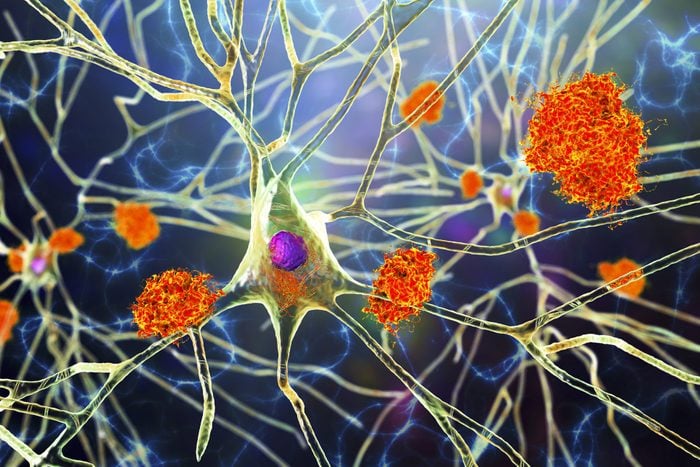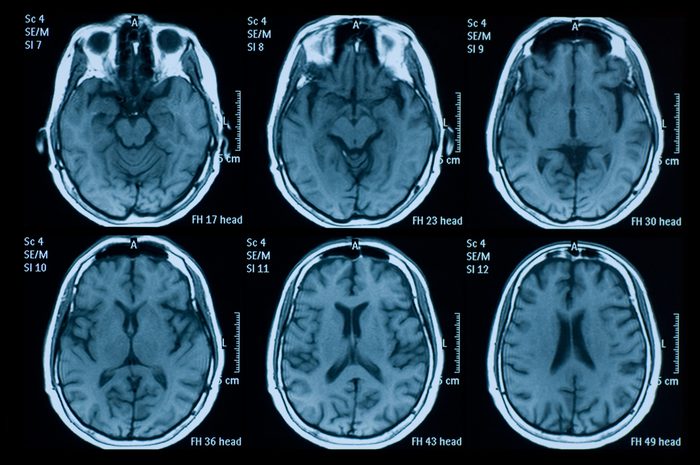
Treatments are desperately needed for Alzheimer’s disease, a disease that affects 6.5 million Americans today and is expected to impact double that by 2050. Breakthroughs have been few and far between. Meanwhile, current therapies are limited to a handful of drugs that can diminish certain symptoms, but reportedly only in some patients.
However, says Eliezer Masliah, MD, director of the division of neuroscience at the National Institute on Aging (NIA), recent unprecedented collaborations and funding may signal that the tide is turning. “There has been an acceleration in research,” Dr. Mashliah tells The Healthy @Reader’s Digest. “We have a national plan to address Alzheimer’s disease.”
Here are some of the recent advances in Alzheimer’s research and treatment.

Attacking the underlying disease process
In September, researchers announced the long-awaited results of a Phase 3 trial into the monoclonal antibody lecanemab. Over the course of 18 months, the drug reduced clinical decline in a group of almost 1,800 people with early Alzheimer’s by 27%. “That 27% reduction is unheard of,” says Jessica Zwerling, MD, professor of neurology and director of the Montefiore Hudson Valley Center of Excellence for Alzheimer’s Disease.
Lecanemab works by preventing the formation of beta-amyloid plaques in the brain. The positive results reinforce the hypothesis that these plaques are indeed a major process driving Alzheimer’s and provide impetus for pursuing related trials.
The Food and Drug Administration (FDA) is currently reviewing lecanemab for market approval while the NIA is funding further studies to see if the drug can benefit other groups of patients.

Other monoclonal antibodies
A year before the lecanemab approval, the FDA waved through Aduhelm (aducanumab), which also attacks amyloid plaques and preceded lecanemab as the first drug to address one of the underlying processes of Alzheimer’s, rather than just symptoms. Despite the approval, studies on Aduhelm’s effectiveness are mixed. “It is somewhat controversial,” says Dr. Masliah. It also costs a substantial $56,000 per year.
But monoclonal antibodies are still one of the hottest areas of research. Aduhelm is now being studied in other groups of people, as are several other monoclonal antibodies, most of which also prevent beta-amyloid from glomming together. Monoclonal antibodies trigger the immune system to attack the beta amyloid. Other monoclonal antibodies which target this protein are in various stages of research and approval, including:
- Donanemab has shown promise for people with early Alzheimer’s.
- Solanezumab did not benefit people with mild or moderate Alzheimer’s, but is being investigated for people with early Alzheimer’s.
- Gantenerumab trials have not shown much efficacy, but researchers hope the method of delivery—IV infusion—can be used more widely.

Targeted therapies against tau protein
Although beta-amyloid seems to be a leading factor in many, if not most, cases of Alzheimer’s, about one-third of patients with early Alzheimer’s show no sign of having brain amyloid. That’s why researchers are also looking at drugs which target tau proteins. Not unlike amyloid, tau proteins pull together into destructive “tangles,” which suffocate brain cells.
“After amyloid, the next big target is tau protein that appears to be the final thing responsible for killing nerve cells,” explains Dr. Masliah. “There are also drugs that decrease expression of tau.” Both drugs and vaccines are currently in development.
6 Signs Your Family Member’s ‘Forgetfulness’ Is Actually Alzheimer’s Disease

Repurposing existing drugs
In addition to developing new drugs, researchers are also seeking out existing drugs which may impact Alzheimer’s. These have the advantage of being already approved, Dr. Masliah says.
Levetiracetam, a common anti-seizure drug, improves learning and memory, but only in Alzheimer’s patients who have epileptic activity in their brain—as many as half of all patients. Unlike Aduhelm, levetiracetam only costs $70 per year.
“Levetiracetam (Keppra) appears to stabilize nerve connections in the brain,” says Dr. Masliah. “The connections among brain cells that we call synapses are impaired very early on in Alzheimer’s and probably are responsible for cognitive problems.”
This Common Skin Condition Could Be Linked to Alzheimer’s
Cancer, heart and diabetes drugs
An experimental cancer drug, saracatinib, restored some memory in mice and is now being tested in humans. Researchers are also studying sargramostim (Leukine), another therapy used in cancer patients. “It’s thought that the drug may stimulate the immune system to protect the brain from harmful proteins,” says Dr. Zwerling. There are also a lot of trials on statins (which lower cholesterol) and insulin, she adds.
“We’re going down that realm with the understanding there are other compounds might have to be on board, like cancer chemotherapeutics,” says Dr. Zwerling. “There are a lot of trials on statins and insulin.”
8 New Breast Cancer Treatments Some Oncologists Are Calling ‘Mind-Blowing’

New biomarkers
Research into Alzheimer’s has been hampered for decades by one unchangeable fact: the inability to see what was going on in the brain. “In the past, the only way we could see what was going on brains was after someone had passed away and donated their brain so we could look at it under a microscope,” says Dr. Masliah.
New biomarkers have created a more hopeful reality. “Now we can see that pathology many years before people develop clinical symptoms,” Dr. Masliah says. “That gives us a much better understanding about timing. We have a new understanding that the pathology starts to occur before clinical symptoms.”
This raises the possibility that Alzheimer’s could be treated, or even prevented, way before memory and other problems appear.

Possible ways to help prevent Alzheimer’s
Stretching for health
Simple stretching may be as effective as aerobics for preventing further decline in individuals with mild cognitive impairment (MCI), which is often a precursor to Alzheimer’s. This conclusion comes from the EXERT Study, which followed non-exercising adults over 12 months. Both were better than no exercise, but researchers were surprised to learn that stretching performed so well.
The findings from EXERT, which has not yet been peer reviewed, suggest that regular physical activity—even modest or low-exertion activity such as stretching—may protect brain cells against damage.
A Daily Stretching Routine for People Short on Time
Avoiding junk food
Less surprising was a finding that people who ate a lot of high-fat, high-sugar, ultra-processed foods like white bread, potato chips and sugar-sweetened sodas showed faster cognitive decline than those who ate a healthier diet. The group that did the worst was people for whom junk food comprised more than 20% of their total diet. For this group, memory and other declines were 28% faster.
This fits in with growing research linking what’s good for our heart is also good for our brain.
Eating These Foods Can Lead to Premature Death, Says New Study

A multivitamin a day…
Results of a study released in September 2022 found that a single, multi-vitamin-mineral supplement a day slowed cognitive aging in more than 2,200 healthy adults with a mean age of 73. The participants in the trial took Centrum Silver tablets.
The Alzheimer’s Association says it’s too early to recommend multivitamins to stave off cognitive decline. The upshot? Multivitamins have few risks, don’t cost much and typically offer other benefits.
Other supplements, including vitamin D and cocoa (studied in the same trial as the multivitamins), have not shown any benefit.

Increased understanding of risk factors
Understanding what increases risk to certain conditions is key to being able to prevent them. While we know some risk factors for Alzheimer’s—genetics, age, diet and exercise—more are coming to light.
Recent research points to hearing loss as potentially connected with cognitive decline. In that study of more than 3,500 participants, those with hearing loss had worse cognition and depression than those without hearing loss. This may be because hearing loss can lead to social isolation which is linked to a higher risk of dementia, says Joe Verghese, MBBS, founding director of the Montefiore-Einstein Center for the Aging Brain and professor in the The Saul R. Korey Department of Neurology at Albert Einstein School of Medicine, New York City.
Other risk factors for Alzheimer’s? Lack of sleep, low socioeconomic status, and race (research suggests Asian, Black, Latino and multiracial people have a higher Alzheimer’s risk).
Ultimately, says Dr. Zwerling, treating and maybe even curing Alzheimer’s will involve a multifaceted approach—one that incorporates different types of medications, along with lifestyle factors.
For more wellness updates, follow The Healthy on Facebook, Instagram, and Twitter. Keep reading:
